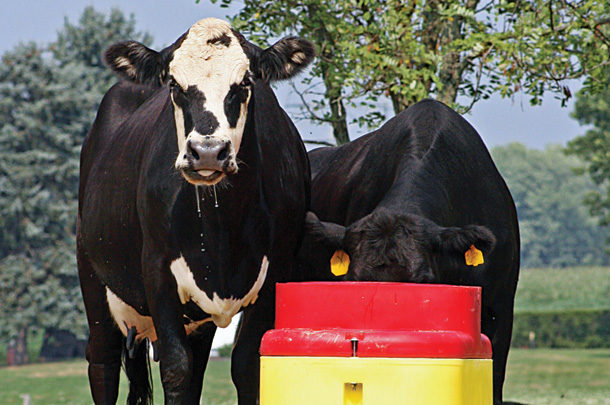Some of the most obnoxious and potentially dangerous insects to both humans and cattle are mosquitos. These bloodsuckers become more of a nuisance during warm weather, and while they’re difficult to avoid, there are ways to reduce their numbers, especially on your land where you and your livestock are most vulnerable.
Mosquito eggs require standing water to hatch into successful larvae, and all mosquitos must have water to complete their life cycles. Breeding happens in stagnant, standing water, and as little as a teaspoon or bottle cap’s worth that’s been standing for a week or more is enough for eggs to develop into adult mosquitoes.
Automatic waterers are sized to provide as much water as your animals want, yet limit the amount that sits in the trough when they are not drinking. That way, the water is fresh and clean. Ritchie’s high flow valves are available in two different sizes, depending on the size of the fountain’s trough. Valves are available in different flow capacities to accommodate different supply line pressures. Because of this, they aren’t an ideal environment for a mosquito to lay eggs.
The following are a few of the many mosquito-borne infections and diseases you can help prevent the spread of with an automatic waterer.
- West Nile Virus – This virus has been identified in the entire continental United States, most of Canada and Mexico. According to the Vermont Beef Producers Association, West Nile Virus has been shown to infect cattle, although it usually doesn’t manifest in actual symptoms. It can, however, cause humans to become ill.
- Dengue Fever - Dengue Fever is caused by any one of four related Dengue viruses transmitted to humans by the bite of an infected mosquito, the most prevalent being the Aedes aegypti. It has been shown to increase in cattle populations during warm weather when mosquito populations are growing.
- Zika Virus - Spread mostly by the bite of an infected Aedes species mosquito, this virus can be passed from a pregnant woman to her fetus. Symptoms include fever, rash, joint pain, conjunctivitis, muscle pain or headache, and there is no current vaccine or medication available. Zika has been shown to infect cattle as well as humans.
In addition to mosquitos, fresh water can also prevent algae and dangerous bacteria from harming your cattle, especially when compared to using natural water sources. The problem with surface water is that it’s far too often contaminated by the chemical runoff of the surrounding land. The higher the concentration of chemicals, the more health issues will surface with your animals. The level of bacteria, viruses, protozoa, algae, and minerals present in surface water is typically higher than other sources. Contamination and stagnation are usually detected far too late, so waterborne illnesses are more common with animals with surface water as their only source.
While mosquitos and algae can be difficult to prevent, maintaining proper water quality during heat and humidity is one way we can all help. Without stagnant water to lay eggs, there’s less chance of you or your animals being infected with dangerous diseases. Find out more about maintaining proper water quality, and find the perfect automatic waterer for you from Ritchie Industries.






